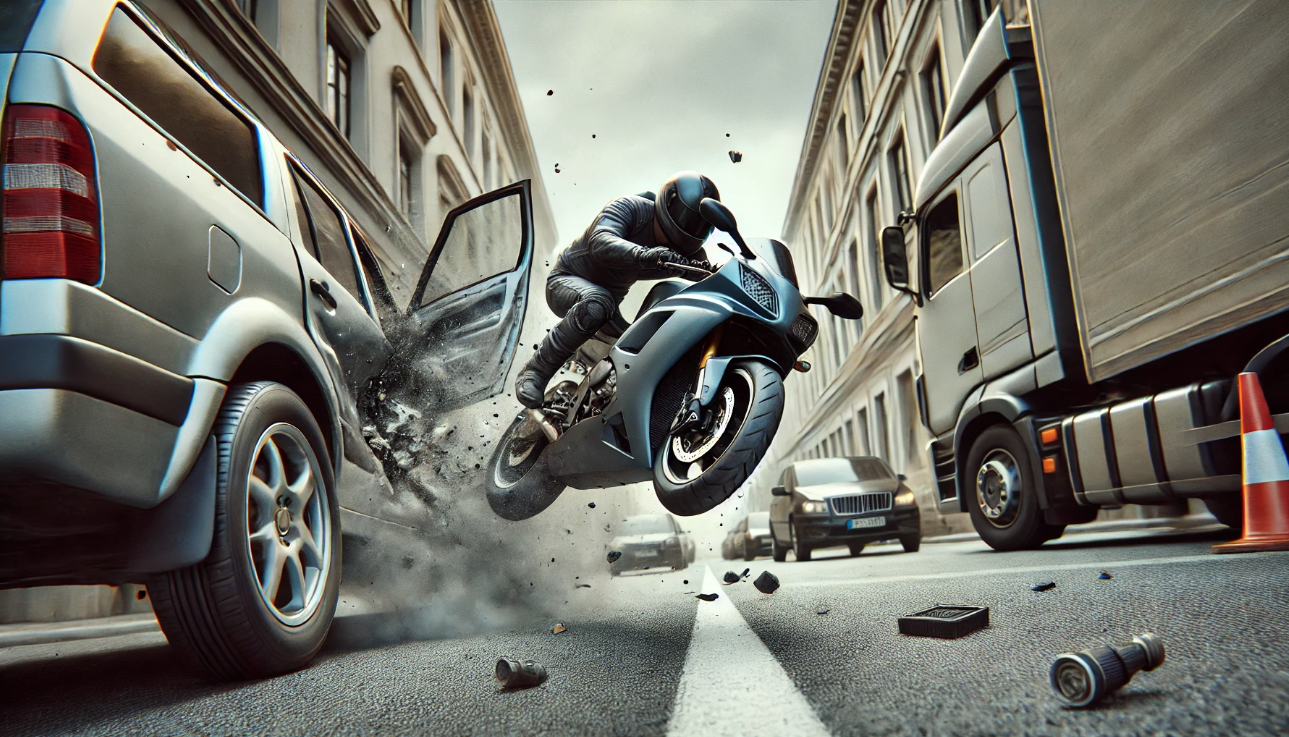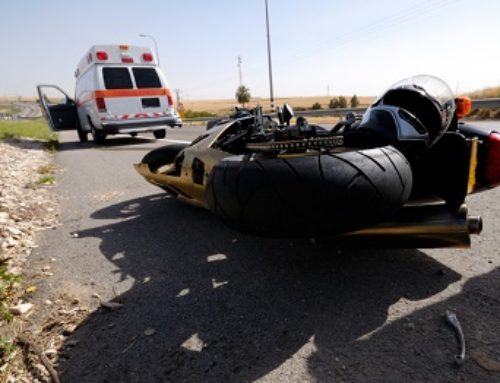Motorcycle accidents are some of the most dangerous incidents on the road. The lack of protection for motorcyclists means that even minor collisions can lead to serious injuries or fatalities. In a heart-stopping moment captured on a dashcam, a motorcyclist crashed into an unexpectedly opened car door and was thrown in front of a large truck. Fortunately, the truck’s high clearance prevented the worst-case scenario.
In this article, we’ll explore the dangers motorcyclists face, the legal implications of wearing (or not wearing) a helmet, and how helmet use can influence compensation after an accident.
The Unique Risks Motorcyclists Face
Motorcyclists are far more vulnerable than car occupants because they lack the physical protection that cars provide. Even low-speed crashes can result in devastating injuries. Some of the most common risks include:
- Limited Visibility
Motorcycles are smaller and harder for other drivers to see, especially in heavy traffic, at intersections, or on narrow streets. This can lead to accidents where drivers fail to yield or don’t notice a motorcyclist in their blind spot. - Sudden Obstacles
As seen in the dashcam footage, an unexpected obstacle—like a car door opening into traffic—can cause severe or even life-threatening accidents. Motorcyclists have less time and space to react compared to drivers of larger vehicles. - Loss of Control
A slight impact can throw a motorcyclist off balance, potentially ejecting them from the bike and into oncoming traffic. This increases the risk of multiple-impact injuries.
The Legal Impact of Helmet Use in Motorcycle Accidents
Helmet use can be a decisive factor in motorcycle accident cases, influencing both liability and compensation. Here’s how:
Helmet Laws in Florida
In Florida:
- Riders under 21 are legally required to wear helmets.
- Riders over 21 can opt out of wearing helmets, but only if they have a minimum of $10,000 in medical insurance coverage.
How Helmet Use Affects Liability
When a motorcyclist doesn’t wear a helmet, the defense may argue that the rider contributed to their injuries—a principle known as comparative negligence. This means:
- If your lack of a helmet worsened your injuries, the compensation you receive could be reduced.
- For example, if you suffer a head injury and weren’t wearing a helmet, the court may find you partially responsible for your damages.
Helmets as a Mitigating Factor
Wearing a helmet can significantly reduce the severity of head injuries, which is why helmet use is often a key point of contention in accident claims. However, even with a helmet, motorcyclists can still suffer:
- Broken bones
- Internal injuries
- Road rash and other external injuries
A helmet might mitigate some injuries, but it doesn’t eliminate the need for legal protection and fair compensation.
Steps to Take After a Motorcycle Accident
If you’re involved in a motorcycle accident, taking the right steps can protect your health and legal rights:
- Seek Medical Attention Immediately
Even if you feel fine, some injuries (like concussions or internal damage) may not be immediately obvious. Getting medical care documents your injuries, which can be critical evidence for your case. - Document the Scene
- Take photos of your motorcycle, the other vehicle(s), any injuries, and the overall scene.
- Include details like skid marks, traffic signs, and weather conditions.
- Collect Witness Information
Eyewitness accounts can support your version of events. Gather contact details from anyone who saw the accident. - Consult a Motorcycle Accident Attorney
Motorcycle accident cases are often complex, especially when helmet use is a factor. An experienced attorney can:- Help determine liability.
- Handle disputes with insurance companies.
- Maximize your compensation for medical bills, lost wages, and other damages.
Why Legal Support Matters
Motorcycle accidents can be devastating, and the legal process can feel overwhelming. Whether or not you wore a helmet, you have the right to fair compensation if someone else’s negligence caused your injuries.
At Bell & Bell, P.A., we specialize in helping motorcycle accident victims navigate the complexities of personal injury law. We understand the challenges motorcyclists face and are committed to protecting your rights.
If you’ve been injured in a motorcycle accident, contact us today for a free consultation.
Stay Safe, Stay Informed
Motorcyclists face higher risks on the road, but understanding the legal implications of helmet use and knowing what to do after an accident can make a significant difference. Follow our blog and YouTube channel for more legal insights and safety tips.



